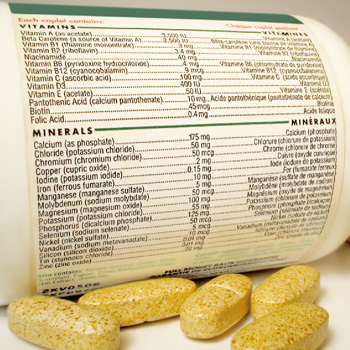A Look at Some of the Top Vitamins

by Gregg Hall
Vitamins (combination of two words: Vital Amines) are the complex organic substance essential in small quantities to the metabolism (nutrition) in most animals. These are found in minute quantities in food, in some cases are produced by the body, and are also produced synthetically. The human body needs them to work properly, so that we can grow and develop just like we should. Their deficiency results in many serious disorders.
Vitamins are divided into two major groups: the ‘fat-soluble vitamins’ designated as vitamin A, vitamin D, vitamin E, and vitamin K, and the ‘water-soluble vitamins’ which include vitamin C and the group of molecules referred to as the vitamin B complex. Each of them has its own special role in the development of human body.
Vitamin A Vitamin A, a fat-soluble vitamin, plays a really big part in eyesight and helps us to see in dim light and also at night. Vitamin A is also involved in the formation and maintenance of healthy skin, hair, and mucous membranes. In addition, it is necessary for proper bone growth, tooth development, reproduction and for the development of epithelial cells (that line any opening to the body e.g.; nose, throat, lungs, mouth, stomach, intestines and urinary tract).
Vitamin A can be found in eggs, milk, carrots, spinach, sweet potatoes, fish oil, liver (pork, lamb, chicken, turkey or beef), butter, broccoli, apricots, nectarines, cantaloupe, and orange or yellow vegetables or fruits. The deficiency of vitamin A can cause two major disorders like: night blindness and drying of skin.
Vitamin B Vitamin B itself is a complex of different vitamins like: B1, B2, B6, B12, niacin, folic acid, biotin and pantothenic acid. These B vitamins are very important in metabolic activity and in facilitating the red blood cell (which carry oxygen throughout your body). They also help your body make protein and energy.
The sources of vitamin B are leafy green vegetables seafood, beans, peas, citrus fruits, whole grains (such as wheat and oats), poultry, meats, eggs and dairy products (like milk and yogurt). Some bacteria in our large intestine also prepare some type of B-vitamins. The deficiency of vitamin B can cause the disease Beriberi, cracked lips, weak muscles, malformation of red blood cells, affects normal growth and disturbs the nervous system.
Vitamin C Vitamin C or ascorbic acid is a water-soluble, antioxidant vitamin that is vital to the production of collagen, a protein that gives structure to bones, cartilage, muscle, and blood vessels. It is important for keeping body tissues, such as gums and muscles in good shape and it helps in quick healing of wounds. In addition, it helps protecting the fat-soluble vitamins A and E as well as fatty acids from oxidation. The vitamin C can be found in citrus fruits (like lemon & orange), cantaloupe, strawberries, tomatoes, broccoli, cabbage and other fresh fruits and vegetables. The deficiency of vitamin C affects the healthy skin; poor wound healing and can lead to a disease called “Scurvy” which causes bleeding in gums, easy bruising, bumps of coiled hair on the arms and legs, pain in the joints, muscle wasting, and many other problems.
Vitamin D Vitamin D is a fat-soluble vitamin that regulates the formation of bone and the absorption of calcium and phosphorus from the intestine. It helps to control the movement of calcium between bone and blood, and vice versa. It is this vitamin you need for strong bones and teeth. In addition it helps your body absorb the amount of calcium it needs.
Vitamin D can be found in fish liver oil, egg yolks, milk and other dairy products fortified with vitamin D. It is also produced in our body in the presence of ultra violet light and sunlight. The deficiency of vitamin D can cause weak bones and bowed legs (in children). And its excess can cause loss of appetite, weight loss, nausea, headache, depression and deposits of calcium in the kidneys.
Vitamin E Vitamin E, a fat-soluble vitamin, is essential for the inhibition of oxidation in body tissues, formation of red blood cells, and also prevents breakdown of body tissues. It maintains the body tissues and protects the lungs from becoming damaged by polluted air.
This vitamin can be found in whole grains (such as wheat and oat), wheat germ, leafy green vegetables, sardines, egg yolks, nuts, bread, cereals and seeds. The deficiency of this vitamin can cause many diseases like cancer, diabetes, heart disease, and Alzheimer’s disease.
About the Author:Gregg Hall is a business consultant and author for many online and offline businesses and lives in Navarre, Fla., with his 16-year-old son. Get a great selection of vitamin and mineral supplements here.
Article Source: ArticlesBase.com – A Look At Some Of The Top Vitamins
